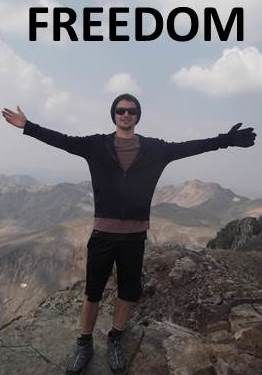Fear
Why Students Are Terrified (to Speak Their Minds)
Fear of offending or being singled out drives self-censorship.
Posted November 4, 2018
This is a guest post by Michael Mllerman, Ph.D. He is a copywriter in Toronto. You can follow him online at @M_Millerman and at https://millermantalks.ca/
As usual, with guest posts, the views of the authors are theirs and theirs alone (though I do think this is an excellent essay).
-------------------------------------------------------------------------------------------------------
In November 2016 I led a first-year political science tutorial at the University of Toronto. Since we were discussing the social construction of identities, I thought I’d get the students to consider whether all identities are socially constructed and, if not, where we draw the line. I told them about a video of a tall white man in his thirties who asked students at a different university how they'd react if he said to them that he identified, first, as a woman, then as black, then as short, then as Chinese, and finally as five years old. I could tell that my students were curious about why it seemed easier to accept the idea that gender is socially constructed, a matter of free choice, than it did to think the same thing about age and the other characteristics. No one was quite willing to see the man as a short, black, five-year-old Chinese girl.
But even though I knew that the topic was interesting and that the students were interested in it, and even though I had gone out of my way to set it up for them so that they’d be eager to discuss it, nobody was saying a word. I asked why, to help understand what I had done wrong in setting up the topic for discussion, so that at least I could do it differently in the next tutorial. One student raised her hand and said I had done fine. The issue wasn’t me. The student said she was silent because she was worried to share her opinion, for fear of being singled out or accidentally saying something offensive. I asked who else was not speaking for that reason. For the first time in my years of experience as a teaching assistant in the classroom, something happened that most teachers dream about: Everyone raised their hands.

No one was talking because everyone was afraid. I encouraged them to speak despite their worries, and asked how I might make it easier for them to do that. Someone suggested that it would be easier if they were assigned an opinion so that they wouldn’t have to be responsible for holding it or feel bad for defending it.
The students were eager to talk. They wanted to talk. But they were afraid of even letting themselves think out loud about a position that might land them in trouble through social sanctions and accusations that they are racists, fascists, bigots, or sexists. Political science students at a top Canadian university had become accustomed to having their mouths kept shut. It’s only a matter of time until the mind shuts, too.
From time to time, moments of ideological persecution on campus make their way into the news. How many such moments are unnoticed, unreported, and unresolved? How many professors have been successful in sabotaging the careers and reputations of students who crossed an invisible red line into the domain of forbidden discourses, illicit beliefs, and dangerous ideas and were therefore called enemies of some kind? How many students learned early on to stay quiet and conformingly repressed their nascent intellectual curiosity?
But what good will it do anyone if the university becomes a place of intellectual repression, rather than intellectual inquiry? If minds are made to tremble and fear, rather than labor in the search for wisdom? How does a society fundamentally dedicated to the dignity of the mind banish certain inquiries to the realm of the inadmissible when those inquiries are themselves but expressions of the dignity of the mind?
Today’s political landscape is rent by division over what is to count as rational and politically acceptable. The divisions are growing, the wounds deepening. If we do not recover a common sense of rationality and inquiry that pays homage to human dignity and decency, if we do not protect the inquiring minds of today’s students and tomorrow’s leaders from over-zealous ideological reprogramming, if we cannot properly detect, map, analyze, and possibly erase, reposition, or redraw the invisible red lines that govern the limits of rational discourse, to make more room for respectful disagreement and to tone down the tendency to see every disagreement as an impasse of enmity, there is little reason to expect the deepest causes of our political self-destruction to abate.

Somewhere within itself, in departments of psychology, philosophy, and political science, for instance, the university must be a place where students are encouraged to think without the fear of reprisal, without ideological tests. A student eager to study intellectual currents in leftist political thought should not be mocked and scorned by professors for whom the left is anathema. The same goes for the right. Neither should leftist or conservative professors distort the study of the classical liberal or any other tradition.
Educators must not neglect to foster the spark of independent thought that animates and elevates the mind. Our next generation of students and leaders cannot fear to acknowledge, on a university campus, of all places, that a tall white man in his thirties is not a short, black, five-year-old Chinese girl. Those who subject their students to ideological tests, chastising them for following their natural intellectual curiosity, scaring them into submission, should consider the old saying about nature and the pitchfork. The respectful and dignified treatment of intellectual curiosity, the fair-minded willingness to withstand, perhaps even to provoke, disagreement, the prudent understanding of the moderate educator—all that is preferable to frightened silence and ideological conformity.
-------------------------------------------
I did not think this was all that controversial, but I was wrong. One of the comments below is blatantly aggressive and insulting. The grand irony is that:
1. There is nothing insulting here.
2. It is not even my essay.
3. The person calls the author a "troll."
You can't make this up. I think I am going to leave it up as an object lesson, but, in general, I will take those down. (Search for "troll" and you can find it).
Please read and understand my rules for engaging in controversial discourse. The short version:
No snark or sarcasm, no personal insults or ad hominem attacks, stay on topic, keep it short, no profanity, but you should read the whole thing.




